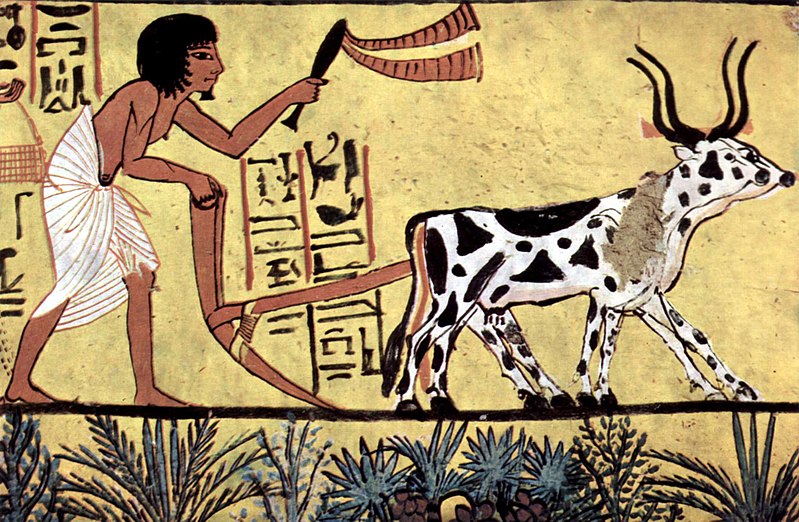 |
| Burial chamber of Sennedjem, Scene: Plowing farmer. Public Domain |
Back on 02 July, Alexis Keinlen retweeted a blogpost suggesting that the differences between organic and "conventional" farming (I always understood that organic was the historically conventional method of farming, but hey...) were not that different. As an example, organic farming has it's own suite of pesticides that are sprayed on fields.
I was quite disappointed by the lack of information contained in the post at Real Clear Science. It cited two systematic reviews, one in the Annals of Internal Medicine (tucked behind a paywall I have no access through), and the other in the American Journal of Clinical Nutrition. The abstract of the first study states in it's conclusion: "The published literature lacks strong evidence that organic foods are significantly more nutritious than conventional foods." (italics mine). The second study, in AJCN, says:
To our knowledge, this is the only systematic review to assess the strength of the totality of available evidence of nutrition-related health effects of consumption of organic foodstuffs. Despite an extensive search strategy, the review only identified 12 relevant articles that met our inclusion criteria and were published, with an English abstract, in peer-reviewed journals over the past ≥50 y. The identified articles were very heterogeneous in terms of their study designs and quality, study population or cell line, exposures tested, and health outcomes measured. This inherent variability prevented any quantitative meta-analysis of the reported results, and from our narrative review, we concluded that evidence of nutrition-related health effects from the consumption of organic food is currently lacking.Ross Pomeroy, who wrote the blogpost at RCS, has this as his takeaway: "The majority of Americans believe that organic foods are healthier than food grown using conventional methods. The majority of Americans are wrong."
But that's not actually what the studies say. Both quotes above use similar language, saying that "evidence is lacking." There is not a statement that organic food is more or less nutritionally good for you. Rather, there is no evidence either way. A study in Critical Reviews in Food Science and Nutrition sums it up best in it's abstract:
Studies comparing foods derived from organic and conventional growing systems were assessed for three key areas: nutritional value, sensory quality, and food safety. It is evident from this assessment that there are few well-controlled studies that are capable of making a valid comparison. (emphasis mine)Pomeroy dismisses the claims that organic food is any better for us nutritionally very quickly, and moves on to a jeremiad against organic agriculture for using various pesticides approved under the USDA organic standards. He claims that these sprays are less effective than those used by industrial agriculture and are frequently more damaging to the environment. There is some evidence he may be correct. But he relies on a piece in Academics Review, a site which is itself rather suspect as being an astroturf-type site (being industry-funded propaganda disguised as posts by disinterested parties. A practice that goes back to the Big Tobacco wars).
The website for Fairness and Accuracy In Reporting (FAIR) points out:
The Koch brothers are the conservative billionaire co-owners of a conglomerate of chemical and oil companies, including Koch Ag & Energy Solutions. They and other biotechnology/chemical companies have a lot to lose from the explosive growth of pesticide-free organic foods.
Academics Review claims to be an independent “association of academic professors, researchers, teachers and credentialed authors” from around the world “committed to the unsurpassed value of the peer review in establishing sound science.”
However, recent articles on its website and Facebook page paint a picture of industry-biased, agenda-driven organization focused on discrediting public interest organizations, organic companies, media outlets and scientists who question the safety of GMOs and pesticides, or who tout the benefits of an organic diet.
The co-founder of Academics Review is Bruce Chassy, a recently retired professor of food microbiology at the University of Illinois at Urbana-Champaign. Chassy was among 11 scientists named by the Center for Science in the Public Interest in a complaint (8/21/03) to the journal Nature for failing to disclose “close ties to companies that directly profit from the promotion of agriculture biotechnology.”
As the letter notes, Chassy “has received research grants from major food companies, and has conducted seminars for Monsanto, Genencor, Amgen, Connaught Labs and Transgene”—companies with a large financial stake in pesticides and GMO technologies designed to boost pesticide sales.
Chassey is also on the advisory board of the American Council on Science and Health (ACSH), a group that bills itself as an independent research and advocacy organization devoted to debunking “junk science.” Carl Winter, one of Slate’s key sources, is also on the ACSH board.
However, as Mother Jones (10/28/13) revealed in a expose based on leaked documents, ACSH’s funders include agribusiness giants Syngenta and Bayer CropScience, as well as oil, food and cosmetics corporations that have a vested interest in getting consumers to stop worrying about the health effects of toxic chemical exposures.

